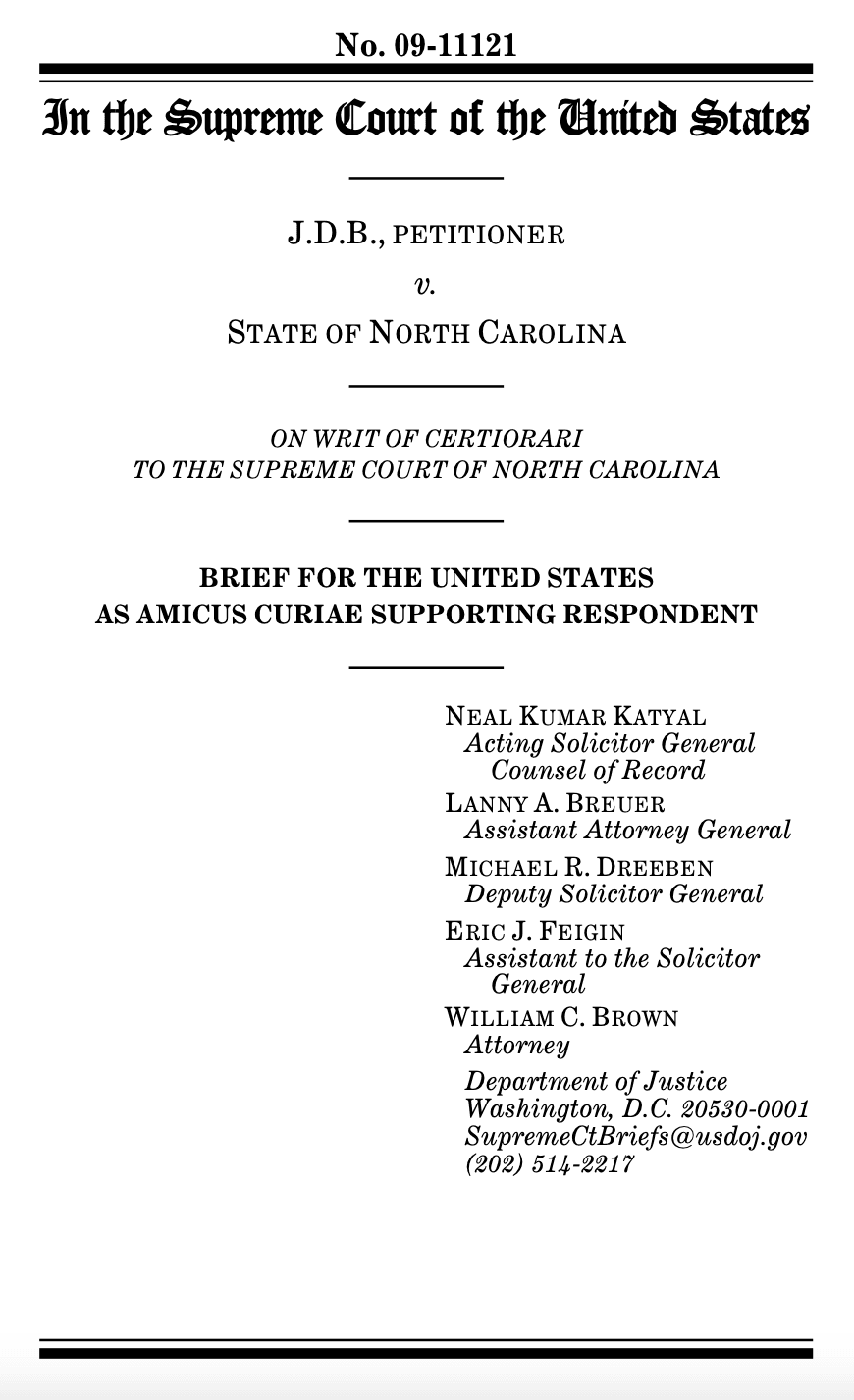
Summary of Argument
In determining whether a suspect is “in custody” under Miranda v. Arizona, 384 U.S. 436 (1966), courts should examine objective restraints surrounding a suspect’s questioning from the vantage point of a reasonable person, rather than seek to tailor the inquiry to the age and the assumed resulting psychological vulnerabilities of the person questioned. The Court has rejected similar factors that would blur the custody inquiry, and the same conclusion is warranted here.
Under the Due Process Clause, courts have examined the totality of the circumstances, including both the objective circumstances of the questioning and the psychological make-up of the suspect, to determine the voluntariness of a suspect’s statements. Experience revealed that application of that fact-sensitive due process test risked the admission of an involuntary custodial confession. In order to counteract that risk, Miranda adopted an additional procedural rule when a suspect is questioned “in custody.” In that setting, the Court established a set of procedures (warning the suspect of his rights and obtaining a waiver) that police must generally follow in order to secure the admission of statements in the government’s case in chief. One of the principal advantages of Miranda is to provide police and courts with clear guidance about how questioning must be conducted in order for statements obtained to be admissible.
The Court has emphasized that an objective test for “custody”—the trigger for the Miranda procedures— plays a critical role in maintaining the clarity of the Miranda rule. See, e.g., Yarborough v. Alvarado, 541 U.S. 652, 667 (2004). The Court has defined “custody” as “a formal arrest or restraint on freedom of movement of the degree associated with a formal arrest” and instructed police and courts that they can identify such a situation by (1) examining “the circumstances surrounding the interrogation” and (2) assessing whether a “reasonable person” in those circumstances would have felt able “to terminate the interrogation and leave.” Thompson v. Keohane, 516 U.S. 99, 112 (1995) (internal quotation marks and citation omitted). In applying the custody test, this Court has focused exclusively on such observable factors as the length and location of police questioning and has excluded such psychological factors as a suspect’s intoxication, emotional distress, or prior experience with police.
Consideration of a suspect’s age—as an indicium of the suspect’s psychological vulnerability—would, for the first time in the 45 years of post-Miranda jurisprudence, blur the custody line by mandating consideration of a psychological factor. “Age”—meant as shorthand for a correlation between youth and “susceptib[ility] to the coercive techniques of police interrogation” (Pet. Br. 9)—is materially different from the sorts of “objective” circumstances that the Court has taken into consideration in past custody determinations. Age, in the chronological sense, is an objective circumstance. But its significance in gauging how a suspect would perceive or react to a given set of restraints is not. Rather, the vulnerability that may accompany youth is an individual psychological characteristic of the sort that this Court has, for sound reason, kept out of the custody analysis.
The Court has stated that “the simplicity and clarity of the holding of Miranda” are not to be compromised “[a]bsent a compelling justification.” Berkemer v. McCarty, 468 U.S. 420, 432 (1984). The inclusion of age as a factor would significantly complicate Miranda custody determinations by requiring officers to ascertain the age of suspects (which is not readily discerned, and which suspects may not disclose) and then make difficult judgments about how that factor might affect the suspect’s perception of events. Courts reviewing officers’ actions would likewise lack determinable standards for factoring age into the custody test.
Consideration of age would therefore likely generate inconsistent results and deprive officers in the field of useful direction. And incorporation of age into the custody inquiry would logically open the door to requiring consideration of a variety of other psychological characteristics, such as mental disabilities or cultural predispositions, effectively collapsing the Miranda custody inquiry back into the due process voluntariness inquiry. There is no need to embark upon such a course. Additional protections against coerced confessions, such as the due process voluntariness test and various statutes, already take age (and other psychological factors) adequately into account. Moreover, the existing custody test already provides ample incentives for police to provide Miranda warnings whenever officers believe it reasonably likely that a suspect is in custody. The lower court therefore correctly concluded that petitioner’s age was not a relevant factor in determining whether he was in custody.